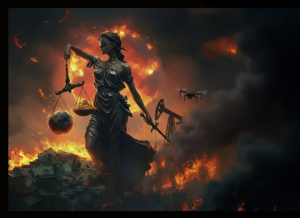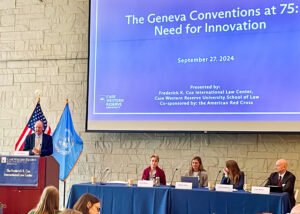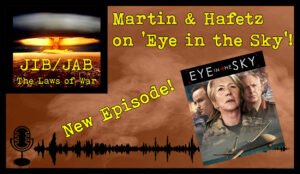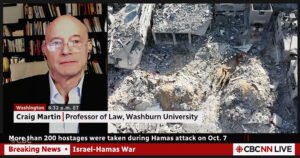 I have launched a new substack, entitled Law in Crisis, which some might find interesting. As the masthead explains, it is a forum for “musings on how law can help our response to crises, and how to respond to the crisis in law itself – use of force and armed conflict, climate change and security, AI and security, constitutional and int’l human rights, and the rule of law more generally.” The plan is to publish an essay of between one to two thousand words at least once a week.
I have launched a new substack, entitled Law in Crisis, which some might find interesting. As the masthead explains, it is a forum for “musings on how law can help our response to crises, and how to respond to the crisis in law itself – use of force and armed conflict, climate change and security, AI and security, constitutional and int’l human rights, and the rule of law more generally.” The plan is to publish an essay of between one to two thousand words at least once a week.
Rule of Law
Discussing Autonomous Weapons Systems and IHL at Case Western Law
 Case Western University School of Law’s annual international law symposium this year focused on the question of whether the Geneva Conventions, enjoying their 75th Anniversary, need to be updated to deal with new challenges, including the application of IHL to space, expanding transnational conflicts with non-state actors, cyber-war, and the development and deployment of fully autonomous weapons systems. The conference began with a closed experts group meeting to discuss the development of a white paper on the issues, followed by an open conference with panels on each of the major topics.
Case Western University School of Law’s annual international law symposium this year focused on the question of whether the Geneva Conventions, enjoying their 75th Anniversary, need to be updated to deal with new challenges, including the application of IHL to space, expanding transnational conflicts with non-state actors, cyber-war, and the development and deployment of fully autonomous weapons systems. The conference began with a closed experts group meeting to discuss the development of a white paper on the issues, followed by an open conference with panels on each of the major topics.
My panel, with Laurie Blank of Emory Univ. Law, Milena Sterio of Cleveland Univ. Law, and Romina Morello of the ICRC, fielded questions from Paul Williams of American Univ. Law, on whether, and how, the Geneva Conventions might need to be updated in some form to better regulate the use of autonomous weapons systems. My article on the subject will be published next year in the Case Western Journal of International Law. Great conference.
Discussing “Eye in the Sky” from a Legal Perspective – Law and Film!
 In the latest episode of JIB/JAB-The Laws of War Podcast, I have a cross-posted episode in which I am the guest of Jonathan Hafetz on his Law and Film Podcast to discuss the film Eye in the Sky. It is a 2015 film likely known to most JIB/JAB listeners, about a joint British and American drone strike against al-Shabaab terrorists in Kenya, and which intelligently and engagingly explores the legal, ethical, philosophical, political, and strategic issues raised by the operation. We not only examine the film’s treatment of the legal issues implicated, including whether IHL should apply at all, and how the principles of distinction, necessity, proportionality, and precautions in attack are illustrated in the film, but we also explore the relationship between these principles and some of the ethical and strategic aspects of the decision-making in the film. We round out the conversation with a discussion of some other engaging films that similarly explore law in the context of armed conflict. I very much enjoyed the conversation!
In the latest episode of JIB/JAB-The Laws of War Podcast, I have a cross-posted episode in which I am the guest of Jonathan Hafetz on his Law and Film Podcast to discuss the film Eye in the Sky. It is a 2015 film likely known to most JIB/JAB listeners, about a joint British and American drone strike against al-Shabaab terrorists in Kenya, and which intelligently and engagingly explores the legal, ethical, philosophical, political, and strategic issues raised by the operation. We not only examine the film’s treatment of the legal issues implicated, including whether IHL should apply at all, and how the principles of distinction, necessity, proportionality, and precautions in attack are illustrated in the film, but we also explore the relationship between these principles and some of the ethical and strategic aspects of the decision-making in the film. We round out the conversation with a discussion of some other engaging films that similarly explore law in the context of armed conflict. I very much enjoyed the conversation!
Speaking to the CBC on the Gaza Conflict
 I was pleased that the media is reaching out to international law scholars to get explanations of the legal issues raised by the conflict in Gaza, and was happy to speak with the CBC’s Canada Tonight show on the topic despite how fraught the issues are, but I found it difficult to provide the necessary nuance or really explain the complexity of any of these issues in the short time provided. It is pity that there is not sufficient time to lay out the issues in a little more depth and sophistication. Some other media, such as Ali Velshi’s spot on MSNBC, have taken a little more time with experts to explain some of these issues more fully. It is important for the public to understand these issues better.
I was pleased that the media is reaching out to international law scholars to get explanations of the legal issues raised by the conflict in Gaza, and was happy to speak with the CBC’s Canada Tonight show on the topic despite how fraught the issues are, but I found it difficult to provide the necessary nuance or really explain the complexity of any of these issues in the short time provided. It is pity that there is not sufficient time to lay out the issues in a little more depth and sophistication. Some other media, such as Ali Velshi’s spot on MSNBC, have taken a little more time with experts to explain some of these issues more fully. It is important for the public to understand these issues better.
